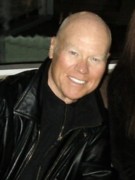A Quote by Laozi
The best form of leadership is to be conscious of the leadership potential with the followers and to let them unleash this potential in a spontaneous way. When a great leader accomplishes this task with effortless ease, the followers say, "We did it ourselves."
Related Quotes
Not many of us will be leaders; and even those who are leaders must also be followers much of the time. This is the crucial role. Followers judge leaders. Only if the leaders pass that test do they have any impact. The potential followers, if their judgment is poor, have judged themselves. If the leader takes his or her followers to the goal, to great achievements, it is because the followers were capable of that kind of response.
Often, in a given project team or network, one sees leadership roles shifting among various members at various times. Attempts to fit these into traditional views of "leader" and "follower" don't quite work. It's more like Twitter: the "leader" has "followers" - but the "followers" are empowered to alter the relationship unilaterally, and the "leader" must continually earn the consent of the "followers."
When you coach and teach leadership, most people think about them. It's like you're the leader and how do you influence them. Clearly, leaders do take their followers, their flock, their enterprise, their business - whatever - hopefully to a better place. But I think the foundation of what makes really great leaders is they lead themselves, and they're conscious about knowing themselves and coaching and leading themselves in a very profound way. The simplest of us talk to ourselves. The question is, "Do we really lead ourselves?"
More than anything else today, followers believe they are part of a system, a process that lacks heart. If there is one thing a leader can do to connect with followers at a human, or better still a spiritual level, it is to become engaged with them fully, to share experiences and emotions, and to set aside the processes of leadership we have learned by rote.
The true leader isn't really looking for leadership. He's trying to set an example and be in the proper way to get the most productive results and don't realize it. When the followers get something done, if the leader has been what he should, they'll feel like they did it, not him. That's the way it should be.
Moral authority is another way to define servant leadership because it represents a reciprocal choice between leader and follower. If the leader is principle centered, he or she will develop moral authority. If the follower is principle centered, he or she will follow the leader. In this sense, both leaders and followers are followers. Why? They follow truth. They follow natural law. They follow principles. They follow a common, agreed-upon vision. They share values. They grow to trust one another.
We need people to be taught that they possess a hidden leader on the inside, and to reconnect to that leader, they must reconnect to the Creator who placed that leadership potential in them. They must be reconnected to God, and this is why we should come back to God not really to go to heaven, but to rediscover our true leadership dominion mandate, and then serve that to the world.
Rob Goffee and Gareth Jones wrote a great piece in Harvard Business Review titled "Managing Authenticity." In it, they argue that establishing authenticity as a leader is a two-part challenge: "First, you have to ensure that your words are consistent with your deeds; otherwise, followers will never accept you as authentic. The second challenge of authentic leadership is finding common ground with the people you seek to recruit as followers.
Perhaps the most promising trend in our thinking about leadership is the growing conviction that the purposes of the group are best served when the leader helps followers develop their own initiative, strengthens them in the use of their own judgment, enables them to grow, and to become better contributors.








































